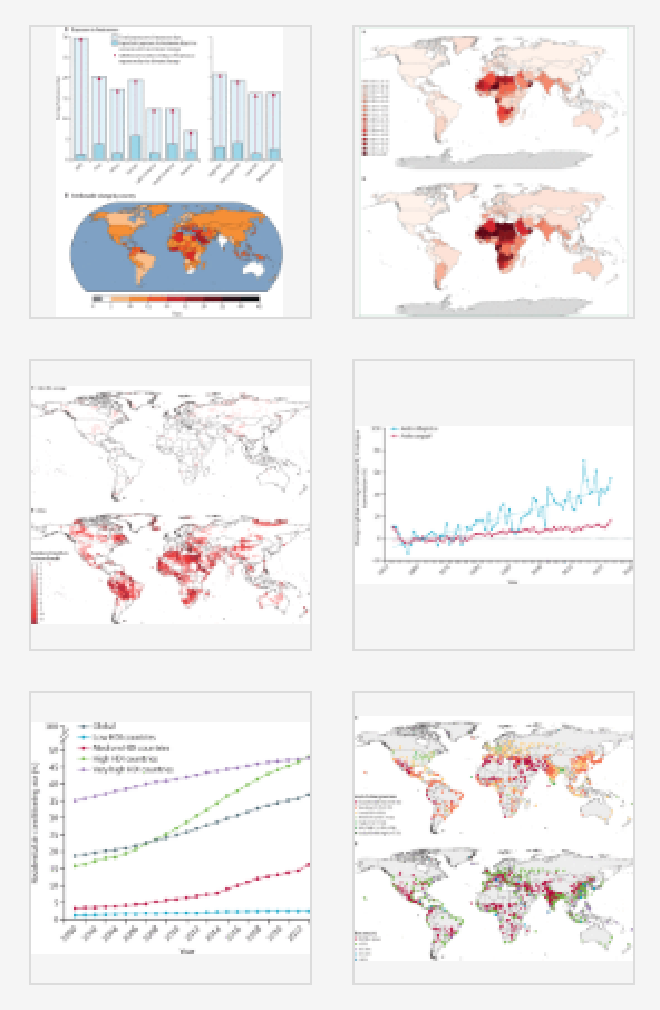

The University of Sydney’s Heat and Health Research Centre contributed to the global report of the Countdown, which is published annually by** The Lancet**, the world’s leading medical research journal and is regularly among its most highly cited articles.
Findings of 2025 report #
This year’s report indicates:
-
2.5 million deaths every year being attributable to the air pollution that comes from continued burning of fossil fuels.
-
Heat-related mortality per 100,000 increased by 23 percent since the 1990s, with total heat-related deaths reaching an average of 546,000 annually between 2012 and 2021
-
The year 2024 was the hottest on record. Worldwide, the average person was exposed to a record extra 16 health-threatening hot days owing directly to climate change, with the most vulnerable (those aged under 1 year and over 65 years) experiencing, on average, an all-time high of 20 heatwave days - a 389 percent and 304 percent increase, respectively, from the 1986–2005 yearly average.
-
Hotter and dryer conditions have fuelled conditions for wildfires, with fine particle pollution (PM 2.5) from wildfire smoke resulting in a record 154,000 deaths in 2024 (up 36 percent from the 2003–2012 yearly average).
-
Heat exposure resulted in a record 639 billion potential hours of lost labour productivity in 2024, with income losses equivalent to US$1.09 trillion (almost 1 percent of global GDP). At the same time, the costs of heat-related deaths in those over age 65 reached an all-time high of US$261 billion.
-
Droughts and heatwaves increased the number of people experiencing moderate or severe food insecurity by 123 million in 2023, compared to the annual average between 1981 and 2010.
-
Across 65 countries with low access to clean energy, air pollution from the household use of dirty fuels resulted in 2.3 million avoidable deaths in 2022; including some of the 2.52 million deaths still attributable to ambient air pollution from the burning of fossil fuels globally.
-
High-carbon, unhealthy diets contributed to 11.8 million diet-related deaths in 2022, which could largely be avoided by transitioning to healthier, climate-friendly food systems.
-
Over 128 million hectares of forest were destroyed in 2023 (up 24 percent since 2022), diminishing the world’s natural capacity to mitigate climate change.
-
15 out of 87 countries responsible for 93 percent of global CO2 emissions spent more on net fossil fuel subsidies than their national health budgets in 2023.
-
Governments collectively spent $US956 billion on net fossil fuel subsidies in 2023. Meanwhile oil and gas giants keep expanding their production plans – to a scale three times greater, on projected production, by 2040 than a liveable planet can support.
-
Private banks are supporting fossil fuel expansion, with the top 40 lenders to the fossil fuel sector collectively investing a five-year high of $US611 billion in 2024 (up 29 percent from 2023). This exceeded their green sector lending by 15 percent.
Positive actions #
-
A growing number of cities (834 of 858 reporting in 2024) have completed or intend to complete climate change risk assessments.
-
The health sector itself has shown climate leadership, with health-related greenhouse gas emissions falling 16 percent globally between 2021 and 2022.
-
Almost two-thirds of medical students around the world received climate and health education in 2024, building capacity for further progress.
-
An increased shift away from coal, particularly in wealthy countries, prevented an estimated 160,000 premature deaths yearly between 2010 and 2022, due to fine particulate air pollution from burning fossil fuels.
-
The share of electricity generated by modern renewables reached a record-high 12 percent in 2022, with the clean energy transition generating healthier, more sustainable jobs.
Professor Anthony Costello, Co-Chair of the Lancet Countdown warned: “as a rising number of world leaders threaten to reverse the little progress to date, urgent efforts are needed at every level and in every sector to both deliver and demand accelerated action that will yield immediate health benefits. As some governments uphold an unsustainable, unhealthy and ultimately unliveable status quo, people around the world are paying the ultimate price. We have to build on the momentum we have seen from local action: Delivering health-protective, equitable, and just transition requires all hands on deck.”
University of Sydney contribution #
Ollie Jay, Professor of Heat and Health and Director of the Heat and Health Research Centre (HHRC), is a Chair of the one of the five working groups, Working Group 1, contributing to the global report making the University of Sydney the host institution of the group.
This group addresses all aspects of health impacts and vulnerabilities and has academic oversight of the 20 indicators associated with it, the highest number of the report, including indicators Professor Jay has led on, supported by University of Sydney HHRC researchers Dr Federico Tartarini and Associate Professor Troy Cross.
-
heatwave exposure of vulnerable populations
-
heat and physical activity
Dr James Smallcombe, also from the HHRC is the Working Group 1 global fellow and an author on the report.
The Lancet Countdown is funded by Wellcome Trust and the online launch event of the global report Wednesday was addressed by speakers including:
-
Chair of the Lancet Countdown, Helen Clark
-
Director of the WHO, Dr Tedros Adhanom Ghebreyesus
-
Chair of Wellcome, Hon. Julia Gillard
The 9th Lancet Countdown annual indicator report is led by University College London and is produced in strategic partnership with the World Health Organization (WHO).
Citation #
- The observational study The 2025 report of the Lancet Countdown on health and climate change was published in The Lancet. Authors: Marina Romanello, PhDa m.romanello@ucl.ac.uk ∙ Maria Walawender, MSPHa ∙ Shih-Che Hsu, PhDb ∙ Annalyse Moskeland, MScc ∙ Yasna Palmeiro-Silva, PhDa ∙ Daniel Scamman, EngDb ∙ James W Smallcombe, PhDd ∙ Sabah Abdullah, PhDe ∙ Melanie Ades, PhDf ∙ Prof Abdullah Al-Maruf, PhDg ∙ Prof Nadia Ameli, PhDb ∙ Denitsa Angelova, PhDh ∙ Sonja Ayeb-Karlsson, PhDi ∙ Prof Joan Ballester, PhDj ∙ Prof Xavier Basagaña, PhDj ∙ Hannah Bechara, PhDk ∙ Prof Paul J Beggs, PhDl ∙ Prof Wenjia Cai, PhDm ∙ Diarmid Campbell-Lendrum, PhDn ∙ Gina E C Charnley, PhDo ∙ Orin Courtenay, PhDp,q ∙ Troy J Cross, PhDd ∙ Carole Dalin, PhDr ∙ Niheer Dasandi, PhDs ∙ Shouro Dasgupta, PhDt ∙ Prof Michael Davies, PhDu ∙ Prof Matthew Eckelman, PhDv ∙ Chris Freyberg, MScw ∙ Paulina Garcia Corral, MSck ∙ Olga Gasparyan, PhDx ∙ Joseph Giguere, BSy ∙ Georgiana Gordon-Strachan, PhDz ∙ Sophie Gumy, PhDaa ∙ Samuel H Gunther, PhDab ∙ Prof Ian Hamilton, PhDb ∙ Prof Yun Hang, PhDac ∙ Risto Hänninen, DScad ∙ Prof Stella Hartinger, PhDae ∙ Kehan He, PhDaf ∙ Julian Heidecke, MScag,ah ∙ Prof Jeremy J Hess, MDai ∙ Prof Slava Jankin, PhDaj ∙ Prof Ollie Jay, PhDd ∙ Dafni Kalatzi Pantera, PhDs ∙ Prof Ilan Kelman, PhDa ∙ Harry Kennarda ∙ Gregor Kiesewetter, PhDak ∙ Prof Patrick Kinney, PhDal ∙ Prof Dominic Kniveton, PhDam ∙ Prof Vally Koubi, PhDan ∙ Rostislav Kouznetsov, PhDad ∙ Pete Lampard, PhDao ∙ Prof Jason K W Lee, PhDab ∙ Bruno Lemke, PhDap ∙ Bo Li, MScaq ∙ Prof Andrew Linke, PhDar ∙ Prof Yang Liu, PhDas ∙ Zhao Liu, PhDat ∙ Prof Rachel Lowe, PhDau ∙ Siqi Ma, PhDav ∙ Prof Tafadzwanashe Mabhaudhi, PhDaw ∙ Carla Maia, PhDax ∙ Prof Anil Markandya, PhDay ∙ Greta Martin, PhDaz ∙ Prof Jaime Martinez-Urtaza, PhDaaa ∙ Prof Mark Maslin, PhDaab ∙ Lucy McAllister, PhDaac ∙ Prof Celia McMichael, PhDaad ∙ Prof Zhifu Mi, PhDaae ∙ James Milner, PhDaaf ∙ Kelton Minor, PhDaag ∙ Prof Jan Minx, PhDaah ∙ Nahid Mohajeri, PhDu ∙ Natalie C Momen, PhDn ∙ Prof Maziar Moradi-Lakeh, MDaai ∙ Prof Karyn Morrisey, PhDaaj ∙ Simon Munzert, PhDk ∙ Prof Kris A Murray, PhDaak ∙ Nick Obradovich, PhDaal ∙ Papa Orgen, PhDb ∙ Matthias Otto, MEngap ∙ Fereidoon Owfi, PhDaam ∙ Olivia L Pearman, PhDaan ∙ Frank Pega, PhDn ∙ Andrew J Pershing, PhDy ∙ Ana-Catarina Pinho-Gomes, DPhila ∙ Jamie Ponmattam, MDaao ∙ Mahnaz Rabbaniha, PhDaam ∙ Tim Repke, PhDaah ∙ Jorge Roa, MScaap ∙ Prof Elizabeth Robinson, PhDaaq ∙ Prof Joacim Rocklöv, PhDag ∙ Prof David Rojas-Rueda, PhDaar ∙ Jorge Ruiz-Cabrejos, MScj ∙ Prof Matilde Rusticucci, PhDaas ∙ Renee N Salas, MDaat ∙ Adrià San José Plana, PhDaau ∙ Prof Jan C Semenza, PhDaav ∙ Jodi D Sherman, MDaaw ∙ Joy Shumake-Guillemot, PhDaax ∙ Pratik Singhaax ∙ Henrik Sjödin, PhDaav ∙ Matthew R Smith, PhDai ∙ Prof Mikhail Sofiev, PhDad ∙ Cecilia Sorensen, MDaay ∙ Prof Marco Springmann, PhDaaz ∙ Jennifer D Stowell, PhDal ∙ Meisam Tabatabaei, PhDaaaa ∙ Federico Tartarini, PhDaaab ∙ Jonathon Taylor, PhDaaac ∙ Cathryn Tonneaaac ∙ Marina Treskova, PhDah ∙ Joaquin A Trinanes, PhDaaad ∙ Andreas Uppstu, PhDad ∙ Nicolas Valdes-Ortega, MScaaae ∙ Fabian Wagner, PhDak ∙ Prof Nick Watts, MAaaaf ∙ Hannah Whitcombe, MPHa ∙ Prof Richard Wood, PhDaaag ∙ Pu Yang, PhDb ∙ Ying Zhang, PhDaaah ∙ Shaohui Zhang, PhDak ∙ Prof Chi Zhang, PhDaq ∙ Shihui Zhang, PhDaaai ∙ Qiao Zhu, PhDas ∙ Prof Peng Gong, PhDaab ∙ Prof Hugh Montgomery, MDaaaj ∙ Prof Anthony Costello, MD
Contact [Notaspampeanas](mailto: notaspampeanas@gmail.com)

